Topics
Behavioral Economics and Business Ethics Companies and Markets Digitization

Senior Economist for Sustainable Digitalisation
Tel: +49 221 4981-703 Mail: engels@iwkoeln.de Barbara Engels @BarEngelsTopics
Research unit
Neligan, Adriana / Schleicher, Carmen / Engels, Barbara / Kroke, Thorsten, 2023, Digitaler Produktpass — Enabler der Circular Economy. Relevanz und Umsetzbarkeit durch Unternehmen, IW-Report, Nr. 47, Berlin / Köln
Zur Studie
Engels, Barbara, 2023, Mit Daten nichts am Hut?. Datennutzungspotenziale für Unternehmen, IW-Policy Paper, Nr. 8, Köln
Zur Studie
Engels, Barbara, 2023, Traumjob Influencer: Likes, Views und das große Geld?. Wie Jugendliche in Deutschland die Creator Economy wahrnehmen, IW-Report, Nr. 46, Köln
Zur Studie
Büchel, Jan / Engels, Barbara, 2023, Data Sharing in Deutschland, in: IW-Trends, 50. Jg., Nr. 2, S. 19-37
Zur Studie
Engels, Barbara / Röhl, Klaus-Heiner, 2023, Innovation durch Kooperation. Wie Mittelstand und Start-ups in der Automobilbranche kooperieren, Studie in Kooperation mit dem VDA – Verband der Automobilindustrie e.V., IW-Report, Nr. 30, Köln / Berlin
Zur Studie
Röhl, Klaus-Heiner / Bardt, Hubertus / Engels, Barbara, 2023, A New Era for the Defense Industry? Security Policy and Defense Capability after the Russian Invasion of Ukraine, IW-Policy Paper, Nr. 2, Berlin / Köln
Zur Studie
Büchel, Jan / Engels, Barbara, 2022, Viele Unternehmen sind nicht bereit für die Datenwirtschaft, IW-Kurzbericht, Nr. 96, Köln
Zur Studie
Büchel, Jan / Engels, Barbara, 2022, Branchentrends beim Data Sharing. Status Quo und Use Cases in Deutschland, IW-Report, Nr. 53, Köln
Zur Studie
Röhl, Klaus-Heiner / Bardt, Hubertus / Engels, Barbara, 2022, Zeitenwende für die Verteidigungswirtschaft? Sicherheitspolitik und Verteidigungsfähigkeit nach der russischen Invasion der Ukraine, IW-Policy Paper, Nr. 4, Berlin / Köln
Zur Studie
Engels, Barbara, 2022, Nachhaltige Digitalisierung. Ein digitalökonomisches Konzept, IW-Policy Paper, Nr. 3, Köln
Zur Studie
Jan Büchel / Barbara Engels, 2022, Datenbewirtschaftung von Unternehmen in Deutschland, in: IW-Trends, 49. Jg., Nr. 1, S. 73-90
Zur Studie
Drehstuhlschnittstellen der deutschen Industrie – Befunde auf Basis einer explorativen Unternehmensbefragung
IW-Report 20/2019
Werbung – Online ist oft teurer, aber auch präziser
IW-Kurzbericht 57/2018
Datenschutzpräferenzen von Jugendlichen in Deutschland - Ergebnisse einer Schülerbefragung
IW-Trends 2/2018
(in cooperation with Hubertus Bardt, Wido Geis, Tobias Hentze, Hans-Peter Klös, Susanna Kochskämper, Jürgen Matthes, Jochen Pimpertz, Axel Plünnecke, Thomas Puls, Thilo Schaefer, Oliver Stettes, Michael Voigtländer, Dirk Werner)
Fiskalische Effekte des Koalitionsvertrags 2018
IW policy papers 5/2018
Online-Meeting statt Dienstreise – Unternehmen könnten 8,3 Mrd. Euro sparen
IW-Kurzbericht 7/2018
(in cooperation with Mara Grunewald)
Das Privacy Paradox – Digitalisierung versus Privatsphäre
IW-Kurzbericht 57/2017
Bedeutung von Standards für die digitale Transformation – Befunde auf Basis des IW-Zukunftspanels
IW-Trends 2/2017
Wirtschaftliche Kosten der Cyberspionage für deutsche Unternehmen – Cybersicherheit als Grundvoraussetzung der digitalen Transformation
IW policy papers 6/2017
Big-Data-Analyse – Ein Einstieg für Ökonomen
IW-Kurzbericht 78/2016
(in cooperation with Vera Demary, Klaus-Heiner Röhl, Christian Rusche)
Digitalisierung und Mittelstand – Eine Metastudie
IW-Analyse, Forschungsbericht Nr. 109
Nicht immer gut – Datenportabilität zwischen Online-Plattformen
IW-Kurzbericht 56/2016
Büchel, Jan / Engels, Barbara, 2022, Digitalisierungsindex 2022. Digitalisierung der Wirtschaft in Deutschland, Kurzfassung der Ergebnisse des Digitalisierungsindex im Rahmen des Projekts „Entwicklung und Messung der Digitalisierung der Wirtschaft am Standort Deutschland“ im Auftrag des Bundesministeriums für Wirtschaft und Klimaschutz (BMWK), Köln
Zur Studie
(in cooperation with Vera Demary, Manuel Fritsch, Henry Goecke, Alevtina Krotova, Christian Rusche, Marc Scheufen, Christopher Thiele, Karl Lichtblau, Edgar Schmitz, Boris Otto, Tobias Korte, Can Azkan, Markus Spiekermann, Dominik Lis, Joshua Gelhaar, Lennart Iggenna, Lukas Maisel, Bernd Trautmann, Jens Fiedler, Osianoh Aliu, Pascal Bresser, Nils Müller)
Data Economy. Status quo der deutschen Wirtschaft & Handlungsfelder in der Data Economy
Studie für das Bundesministerium für Wirtschaft und Energie (BMWi), 2019
(in cooperation with Alexander Burstedde, Wido Geis, Hanno Kempermann, Matthias Niendorf, Thomas Puls, Klaus-Heiner Röhl, Christopher Thiele)
Die Zukunft des Ruhrgebiets – Wirtschaftliche Lage und Potenziale des größten deutschen Ballungsraumes
Gutachten für die Landesvereinigung der Unternehmensverbände NRW (unternehmer nrw), 2018
(in cooperation with Matthias Ammann, Fabian Schnell, Clemens Wallner))
Max Weber in der Digitalisierungsfalle? E-Government in Deutschland, Österreich und der Schweiz
Gutachten im Auftrag von Avenir Suisse, 2018
(in cooperation with Christoph Busch, Vera Demary, Justus Haucap, Christiane Kehder, Ina Loebert, Christian Rusche)
Sharing Economy im Wirtschaftsraum Deutschland
Gutachten im Auftrag des Bundesministeriums für Wirtschaft und Energie, 2018
(in cooperation with Martin Beznoska, Tobias Hentze, Axel Plünnecke, Thomas Puls, Thilo Schaefer, Björn Seipelt, Christopher Thiele, Michael Voigtländer)
Wirtschaftsstandort Hessen – Bestandsaufnahme und Handlungsempfehlungen
Gutachten für die Vereinigung der Hessischen Unternehmerverbände, 2018
(in cooperation with Michael Voigtländer)
Digitalisierung und Immobilienfinanzierung – Potenziale und Perspektiven
Gutachten für die TXS GmbH, 2017
(in cooperation with Vera Demary, Christian Rusche)
Qualitative und quantitative Auswirkungen der Sharing Economy in Nordrhein-Westfalen
Gutachten für das Ministerium für Wirtschaft, Energie, Industrie, Mittelstand und Handwerk des Landes Nordrhein-Westfalen, 2016
(in cooperation with Vera Demary)
Collaborative Business Models and Efficiency – Potential Efficiency Gains in the European Union
Impulse Paper for the European Commission, 2016
(in cooperation with Tobias Hentze, Axel Plünnecke, Thomas Puls, Klaus-Heiner Röhl)
Die wirtschaftliche Situation Nordrhein-Westfalens – Bestandsaufnahme und Handlungsempfehlungen
Gutachten für die Landesvereinigung der Unternehmensverbände Nordrhein-Westfalen unternehmer nrw, 2016
Büchel, Jan / Engels, Barbara, 2022, The Importance of the Data Economy for Europe’s Digital Strategic Autonomy, in: European Liberal Forum (Hg.), Decoding EU Digital Strategic Autonomy. Sectors, Issues, and Partners, Techno-Politics Series, No.1, S. 13-18
Zur Studie
Data Governance as the Enabler of the Data Economy
Intereconomics, vol. 54, no. 4, 2019, pp. 216–222
(in cooperation with Christoph Busch, Vera Demary, Christiane Kehder, Ina Loebert,
Christian Rusche)
Sharing Economy in Deutschland, Stellenwert und Regulierungsoptionen für Beherbungsdienstleistungen
Nomos Verlag, Baden-Baden, 2019
Lost in Translation: the Role of Standards for the Digital Transformation
CCSBE/CCPME Conference Proceedings, Quebec City, 2017, pp. 300–315
(in cooperation with Johannes Geyer, Peter Haan)
Pension incentives and early retirement
Labour Economics, Vol. 47, 2017, p. 216–231
Detours on the Path to a European Big Data Economy
Springer Nature, http://rdcu.be/uR9L, 2017
Data Portability and Online Platforms The Effects on Competition [Extended Abstract]
29th Bled eConference - Research Volume, 2016
Data portability among online platforms
Internet Policy Review, 5. Jg., Nr. 2, DOI: 10.14763/2016.2.408
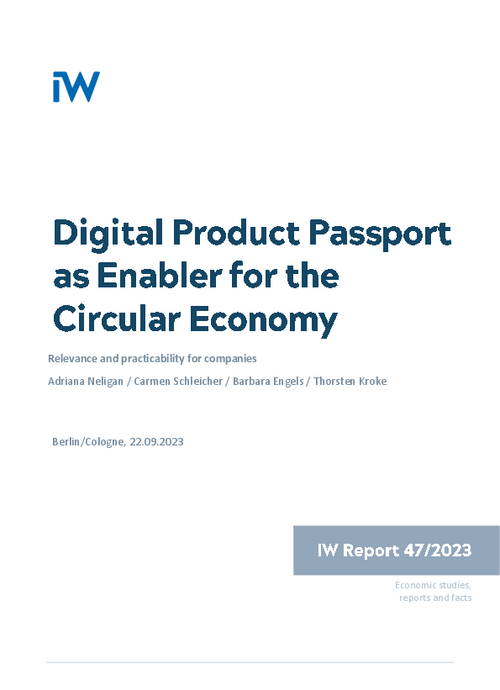
In a circular economy, a new understanding of economic activity and an alternative approach to raw materials are required. Resources should be used for as long as possible in order to reduce both the material and energy consumption as well as the waste and emissions of an economic system to a minimum.
IW
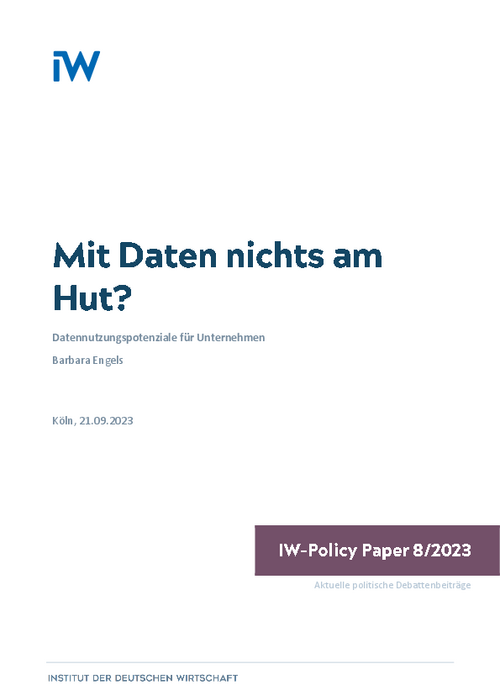
If companies want to survive on the market in the long term, they cannot avoid the topic of data.
IW
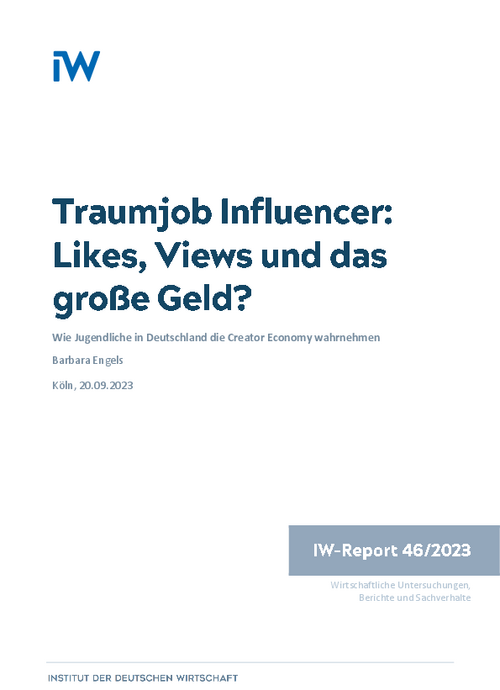
The Creator Economy is booming: more and more companies use content creators to promote their products, and more and more people want to become content creators themselves, i.e. create their own digital content, make it available to a growing audience on digital platforms and monetise it.
IW
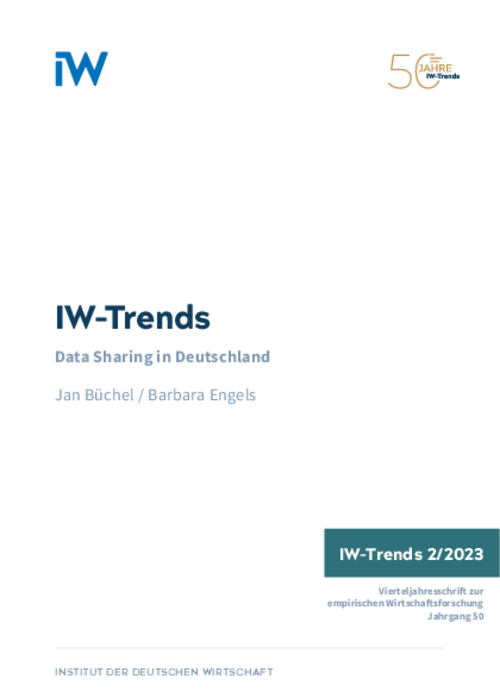
Digital data is a key element in processes, products and business models. Thus, data sharing is a matter of great importance. The present analysis examines how intensively companies in Germany share data.
IW
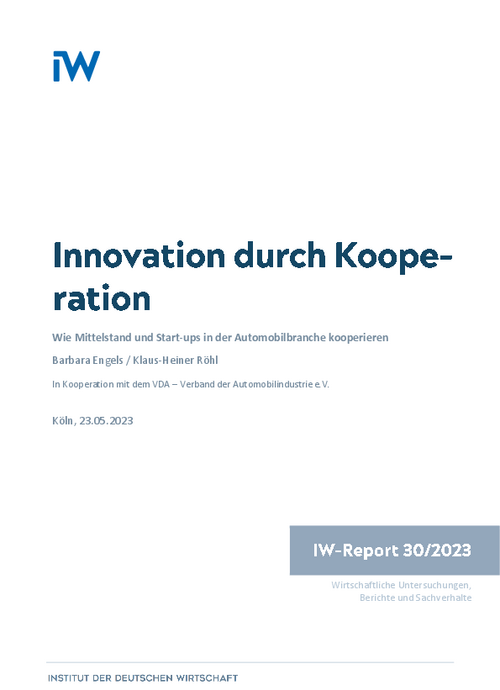
Cooperation between established companies and start-ups offers expanded opportunities to innovate and drive the digitalization of the economy.
IW
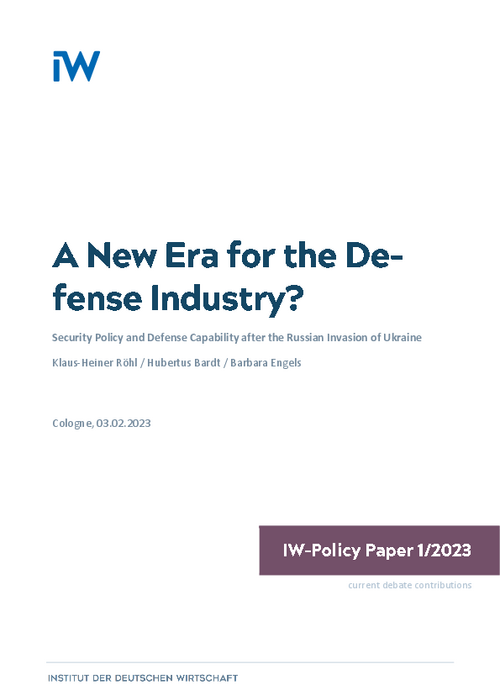
The Russian attack on Ukraine has brought the question of the German Armed Forces’ operational capability back into focus. National defense, which seemed to play only a minor role with the end of the Cold War and the dissolution of the Warsaw Pact and the Soviet Union in 1991, now has gained a higher political priority again.
IW
The economy in Germany becomes only slightly more digital in 2022 compared to 2021: The Digitalisation Index rises from 107.9 to 108.9 points. Following the sharp rise in 2021, digitalisation can be said to stagnate in 2022.
IW
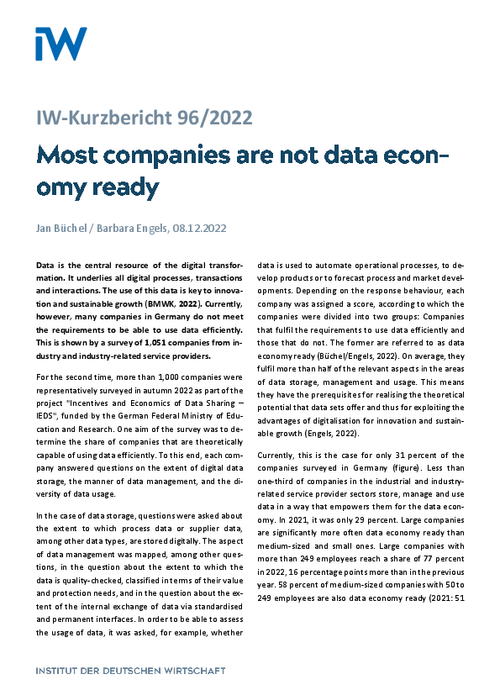
Data is the central resource of the digital transformation. It underlies all digital processes, transactions and interactions. The use of this data is key to innovation and sustainable growth (BMWK, 2022). Currently, however, many companies in Germany do not meet the requirements to be able to use data efficiently. This is shown by a survey of 1,051 companies from industry and industry-related service providers.
IW
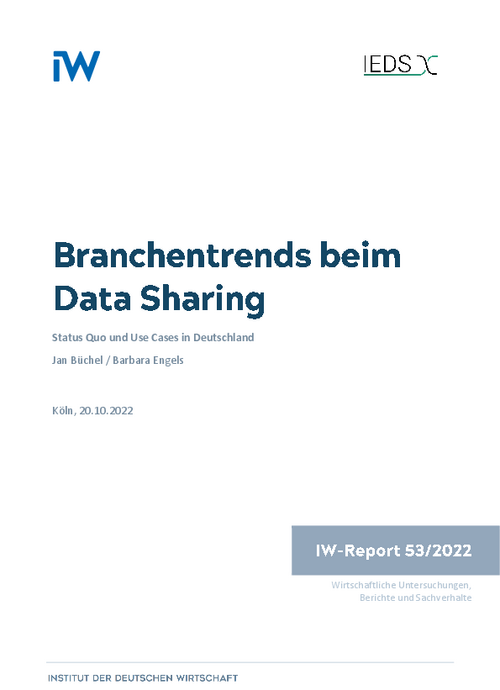
Data is generated everywhere along the value chain. Each player produces data specifically or as a by-product at various points in the production process. This data can offer significant benefits for the companies themselves and for the economy as a whole.
IW
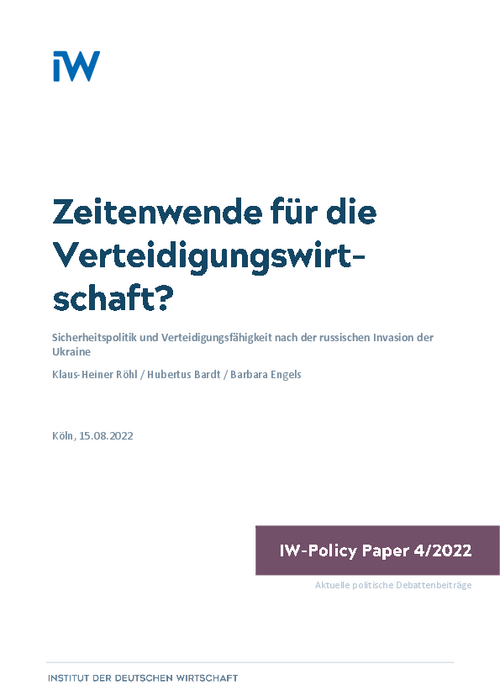
The Russian attack on Ukraine has brought the question of the German Armed Forces’ operational capability back into focus. National defence, which seemed to play only a minor role with the end of the Cold War and the dissolution of the Warsaw Pact and the Soviet Union in 1991, now has gained a high political priority again.
IW